Artists' Writing
Artists' Writing
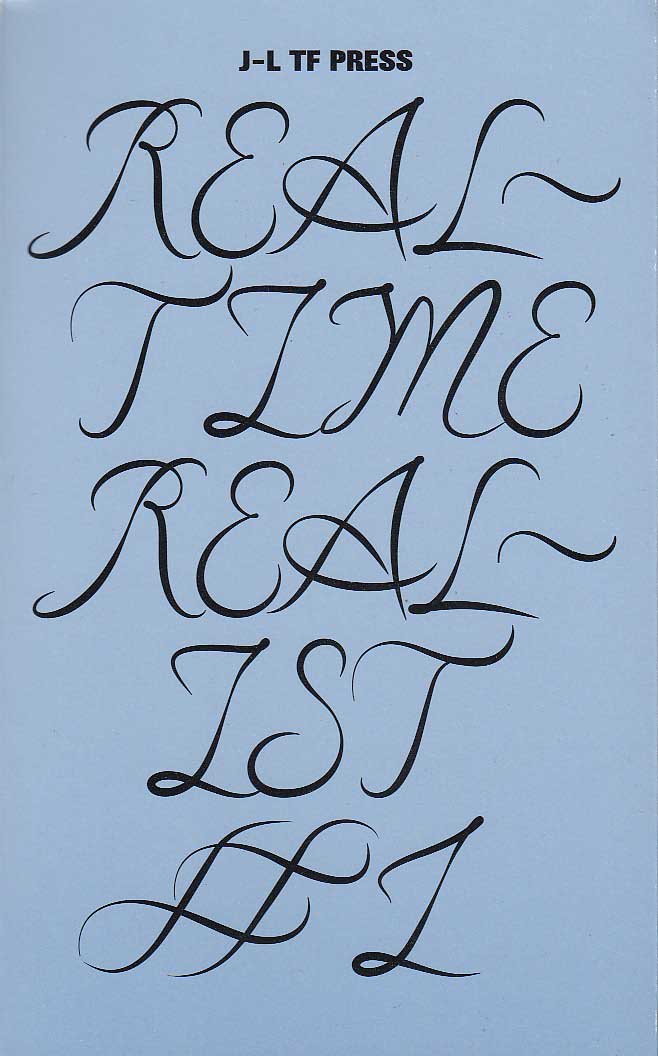
Typefaces have other interests besides words
Charlie Clemoens, Jungmyung Lee
This first issue of Real-Time Realist explores amazement, distraction, surprise and awe (the blue sector of Robert Plutchik's Wheel of Emotions) with contributions from invited artists distilling the aforementioned emotions. [publisher’s note.]
Real-Time Realist gathers contributions by graphic designers, writers, and artists, most of them living in the NL and former students of the Gerrit Rietveld Academie or the Werkplaats Typografie.
Contributors: Jungmyung Lee, Josse Pyl, Carson Lee, Charlie Clemoes, Laura Pappa, Lieven Lahaye, Will Pollard, Mathew Kneebone, Max Gershfield, Rudy Guedj.
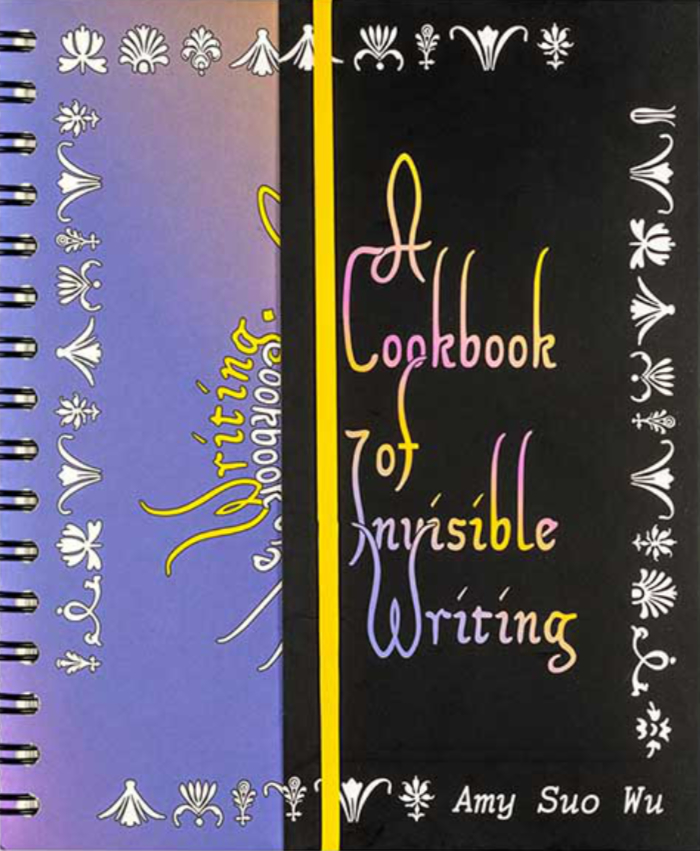
Cookbook of Invisible Writing
A Cookbook of Invisible Writing, by Dutch artist, designer and teacher Amy Wu, is an introduction to analog steganography—a type of secret writing that is hidden in plain sight. This book serves as a starter pack to run workshops with groups who are interested in alternative forms of communication. It contains invisible ink recipes and other invisible communication techniques that may be used to subvert surveillance and bypass censorship, but also inspire your community to develop poetic and playful forms of communication to nurture social bonds. In the tradition of esoteric manuals published on secret writing, this cookbook also channels the spirit of everyday access and the easy distribution and sharing of practical knowledge.
Following Giambattista della Porta's 1558 popular science book Natural Magic—one of the first major publications that detailed simple but diverse recipes of invisible inks for public consumption—this cookbook aims to bring this obscure field to a wider audience. The publication includes a critical essay about the history of surveillance through a feminist and postcolonial lens. The last chapter presents Wu's own body of work that aims to revive analog techniques as a counter to today's digitally surveilled mediascape.

Théorie De L'Indiscernable
João Maria Gusmão, Pedro Paiva
Livret de 56 pages; format 13x21; illustré; couverture souple; cousu. Traduction originale du portugais ("Teoria do indiscernível" texte figurant dans le vol. "Abissologia - Teoria do Indiscernível", Lisboa - 2012). Édition bilingue portugais-français.
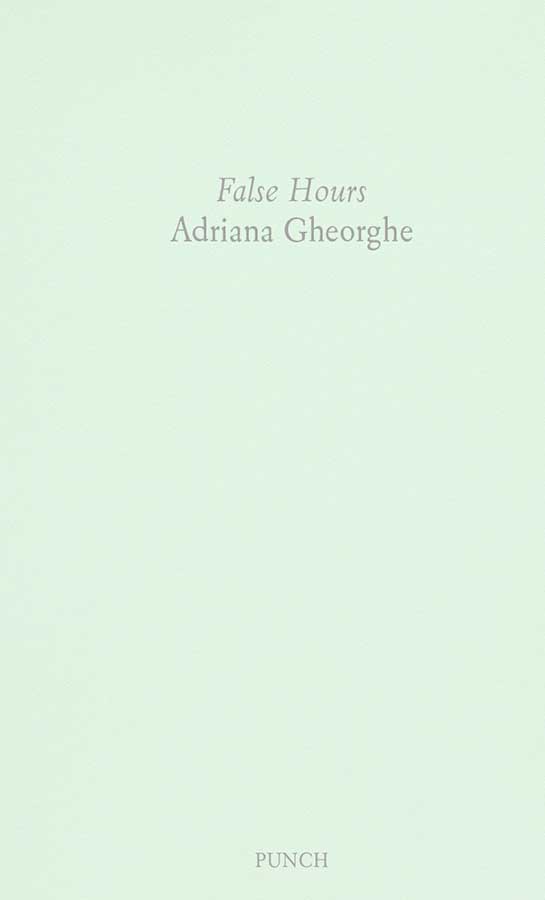
False Hours
Adriana Gheorghe works with performance and writing and a gravely irreverent sense of indeterminacy, while in relation to contexts (conceptual, physical, political, human), and for the reformulation of the same ongoing artistic and living practice – the performative imagining of the humans in relation to language and representation, hijacking subjectivity and identity with the crack of endless potentiality.

Square of Will in Square of Love
A collection of texts, notes and drawings from Alina Popa (1982-2019), edited as a tribute publication by her longtime accomplice, the artist Florin Flueras. A political and theoretical work that questioned both the intimate and social mechanisms of the contemporary.
Square of Will in Square of Love gathers a selection of texts, notes and drawings by Alina Popa, edited by Florin Flueras. Most texts are more poetic and more personal than Alina’s previously published writing, “...a mixture of styles, subjects and mediums—theory, poetry, drawings, diary notes, it's unclassifiable, as she liked it.” (Florin Flueras).
Alina Popa (1982-2019) was a Romanian artist who moved between choreography, theory, and contemporary art.

Corner Vol. 1
Paul Breazu, Raluca Voinea and 2 more
CORNER football+society VOL.1 comprises all contributions from the first six issues of the eponymous artist-run magazine, published in Romanian between 20015-2017.
With texts and conversations by: Mihnea Anţilă, Octav Avramescu, Violeta Beclea-Szekely, Matei Bejenaru, Declan Clarke, Irina Costache, Ion Dumitrescu, Florin Flueras, Bogdan Ghiu, Christopher Johnson, Cosima Opârtan, Florin Oprea, V. Leac, Andrei Mihail, Vasile Mihalache, Anca Verona Mihuleţ, Petrica Mogoş, James Montague, Cat Năstăsoiu, Pompiliu Nicolae-Constantin, Alexandra Pirici, Florin Poenaru, Ovidiu Pop, Powerpuff, Corneliu Porumboiu, Anamaria Pravicencu, Claudiu Revnic, Matei Sâmihaian, Ben Shave, Ştefan Tiron, Ovidiu Ţichindeleanu and artworks by: Enric Fort Ballester, Alex Bodea, Irina Botea + Jon Dean, Ion Grigorescu, Hortensia Mi Kafchin, Cătălin Mihalache, Monotremu, Dan Perjovschi, Alexandra Pirici & Jonas Lund, Raluca Popa, Gabriele de Santis, Sergiu Sas.
CORNER fotbal + societate is a periodical publication that proposes a crossdisciplinary approach, taking football and its complex contemporary and historical context as a starting point. This material foregrounds less (re)presented subjects and follows its evolution and social determinations. Aiming to intersect the culture of sport with various fields of knowledge such as anthropology, art, contemporary dance, architecture and economics, it follows less discussed aspects such as horizontal organisation, representation of minorities, gender power relations, subcultures and the relationship between the individual, group and society - amongst other topics. Under the current conditions, where both sport and art are being confiscated by the media and transformed into commodities, CORNER reclaims the democratic and emancipatory aspects of football, alongside a critical analysis of its functioning and reception modes.

Spread Wide
Rebecca Stevens, John Cussans and 2 more
Various artists and authors use two writers' correspondence as a primary source to develop an artistic and literary falsification. In this collaborative volume, the writer and artist Paul Buck works with the late 29 Kathy Acker. Using as source the raw materials of their correspondence from the early Eighties, a period when Acker was writing Great Expectations and trying to leave America for London, Buck confronts issues of appropriation, sampling, and plagiarism, relevant then and now.
Further encounters are triggered by writer Rebecca Stephens, artist John Cussans... and playwright Richard Foreman, artist Susan Hiller, musician David Coulter. Kathy Acker (1947-1997) was at the forefront of transgressive writing from the Seventies until her death. Her provocative intertextual narratives—halfway between autobiography and pornography—were developed in lectures, performances and films (Variety, Bette Gordon).
Her published work includes Blood and Guts in High School (1984), Don Quixote (1986), and Empire of the Senseless (1988). Rebecca Stephens escaped the chains of theology teaching to write on Saints and Courtesans, subjects on which books are in the pipeline.
John Cussans is a writer, artist and researcher who has exhibited regularly in London, Berlin, Slovenia, Vienna, Vancouver. In 2001 he founded The Bughouse, an art-event generator inspired by the work of Philip K. Dick. Paul Buck (born 1942, United Kingdom) is a British poet, performer and author of more than fifty crime novels. He has been challenging notions of writing, narrative, and the limits of the feasible since the late Sixties in books like The Honeymoon Killers, Violations and Lust, Walking into Myself... Chief editor of Curtains magazine, he introduced many French authors to the English audience.
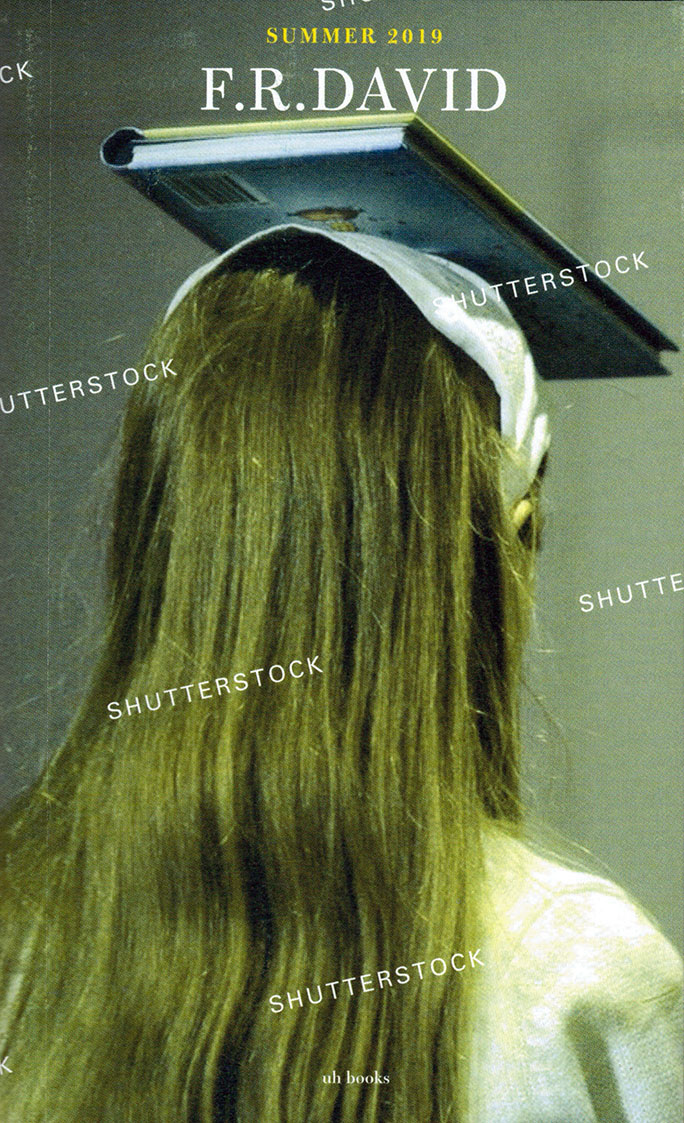
F.R. David - Recto Verso
F.R.DAVID is a typographical journal, dealing with the organisation of reading and writing in contemporary art practises. The 18th issue, “Recto Verso” is edited by Will Holder, and had its beginnings in prosody, the measure of language, geometry, and a notion of imagist transcription, even. A two-dimensional exercise, it turns out, on paper. Words were tuned out, in favour of the volume of values our bodies exchanged: “the historical and bodily movement of language amongst subjects.” Attentions turned—taking (the measure of) classes in body language: the non-verbal: the insinuated: the reverse-side of image: the backside, and, oddly: Oh no: we don’t speak about that—to the next page…
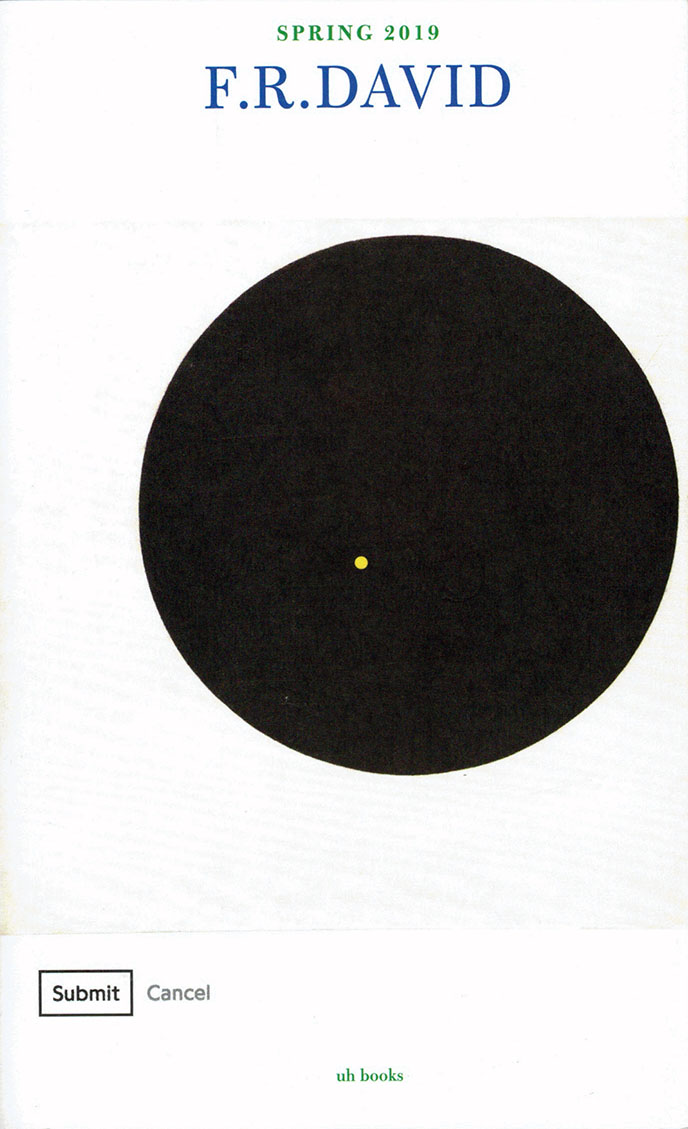
F.R. David - Black Sun
“Black Sun” the 17th issue, edited by Will Holder in conversation with Krist Gruijthuijsen, to accompany the exhibitions David Wojnarowicz Photography & Film 1978–1992, Reza Abdoh, and TIES, TALES AND TRACES. Dedicated to Frank Wagner, Independent Curator (1958–2016), at KW Institute for Contemporary Art, Berlin. The issue departs from Wojnarowicz’s grief at the loss of loved ones during the 1980s AIDS crisis, and anger at the US government for their willful neglect of this loss.
The issue assembles a chorus of various gendered and sexual positions, all seeking support, love and intimacy in linguistic, architectural and bodily structures, all the while under threat of collapse. These voices are threaded together with excerpts from Julia Kristeva’s white, feminist, psychoanalytical, semiotic Black Sun. Depression and Melancholia (1992).
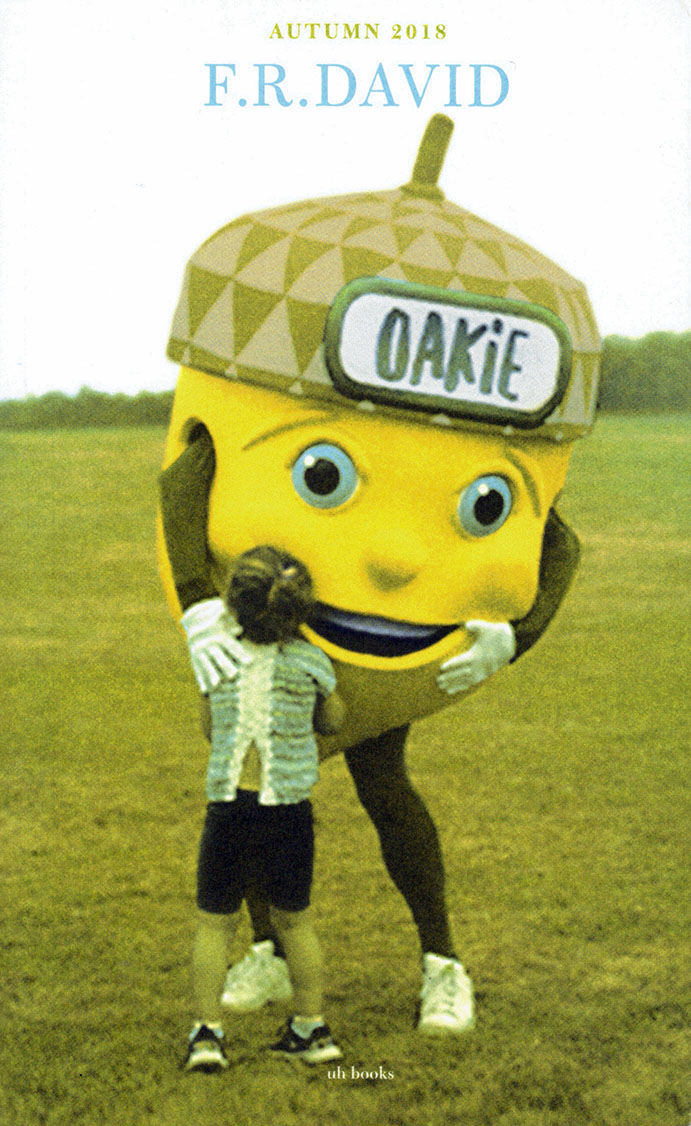
F.R. David - what I mean is—
F.R.DAVID is a typographical journal, dealing with the organisation of reading and writing in contemporary art practises. “what I mean is—” the 16th issue, edited by Will Holder.
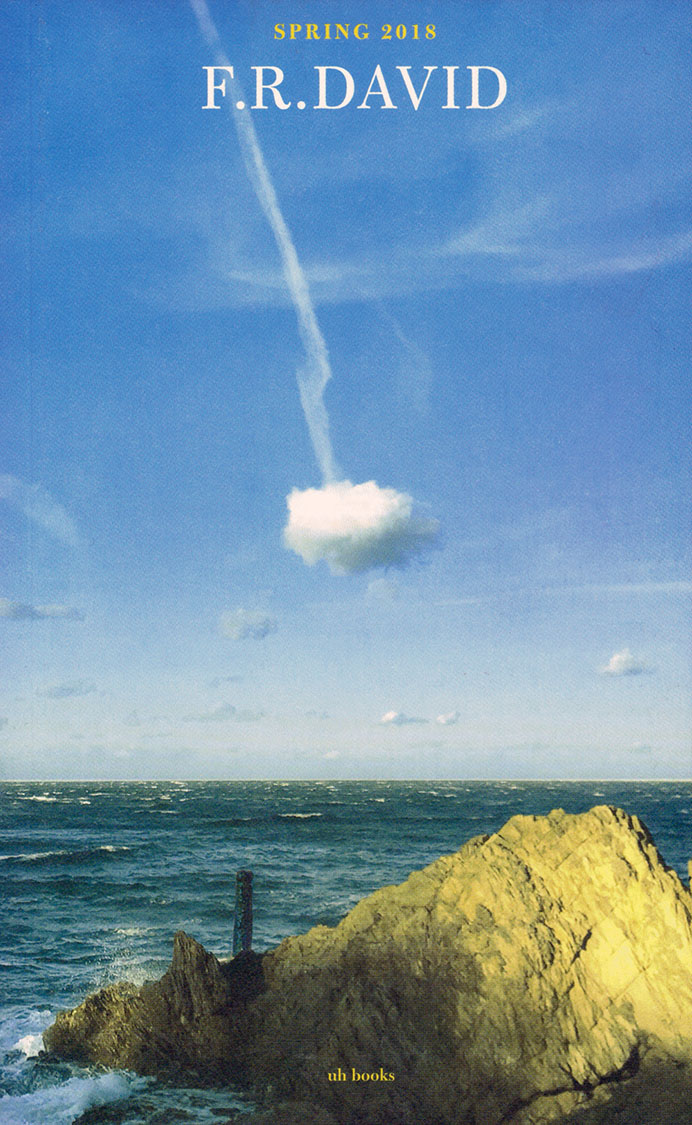
F.R. David - Flurry
F.R.DAVID is a typographical journal, dealing with the organisation of reading and writing in contemporary art practises. “Flurry” is the 15th issue (a best-of, of sorts) edited by Will Holder. “I realized very slowly over a period of time that the activity of framing a performance and the intentions that accumulate around that activity produce a certain anxious kind of mode, and I became bothered by the flurry of activity and how it tends to mask so many things.”
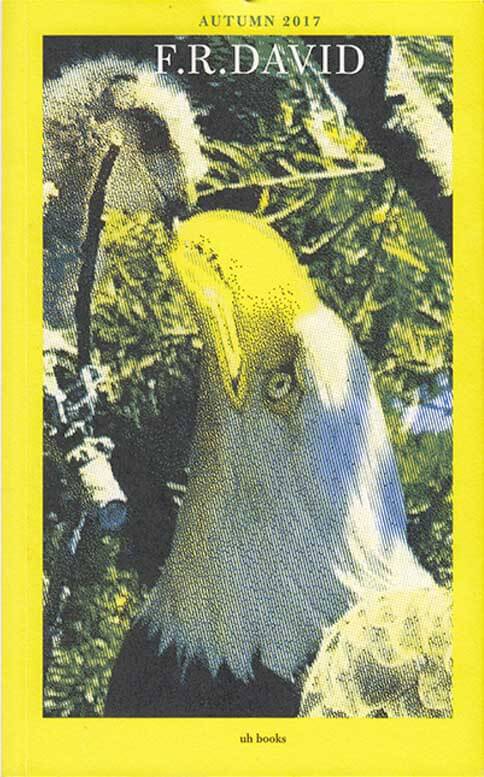
F.R. David - Recognition
“Recognition” is concerned with bodies, ecology, empathy, gazing at the world, and reading (environments) from non-anthropocentric POVs—nonetheless described and written by humans. Animals, birds, and trees feature heavily.
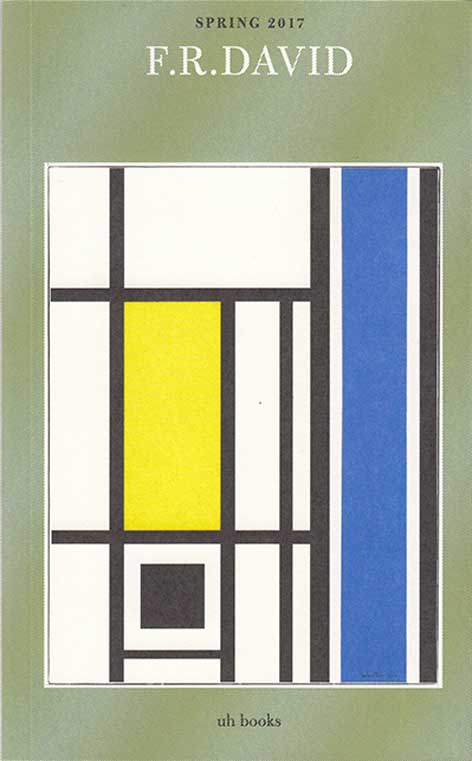
F.R. David - Inverted Commas
F.R.DAVID is a typographical journal, edited by Will Holder, dealing with the organisation of reading and writing in contemporary art practises. This 13th issue of F.R.DAVID is edited with Riet Wijnen, and has its origins in her Registry of Pseudonyms, an online database which accounts for who is who and why who is who. ‘Inverted Commas’ follows ‘pseudonym’ through names, naming, bodies, brains, self, author, other, reader, labour.
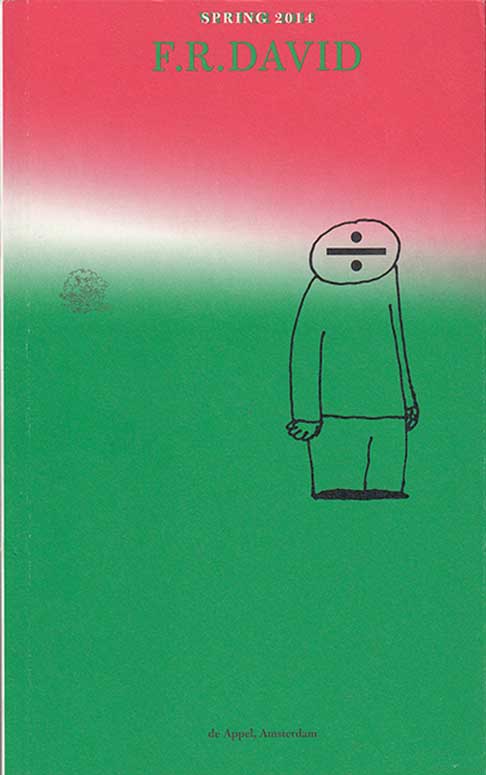
F.R. David - All distinctions are mind, by mind, of mind
F.R.DAVID is a typographical journal, dealing with the organisation of reading and writing in contemporary art practises.
This issue, “All distinctions are mind, by mind, of mind”, has a split personality, allowing comparative readings between left/ right, good/ bad, manic/ depressive.
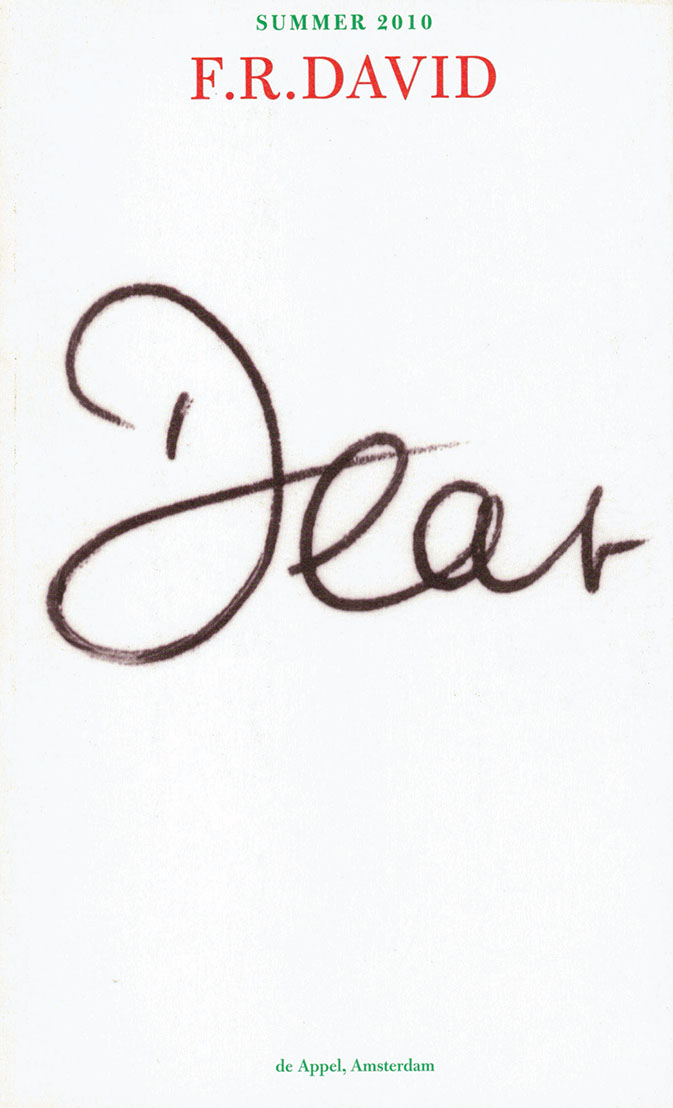
F.R. David - With Love
F.R.DAVID is a typographical journal, dealing with the organisation of reading and writing in contemporary art practises.
“With Love,” takes correspondence and calligraphy—or letter-writing—as model for information theory, and adaptive, cybernetic relations.
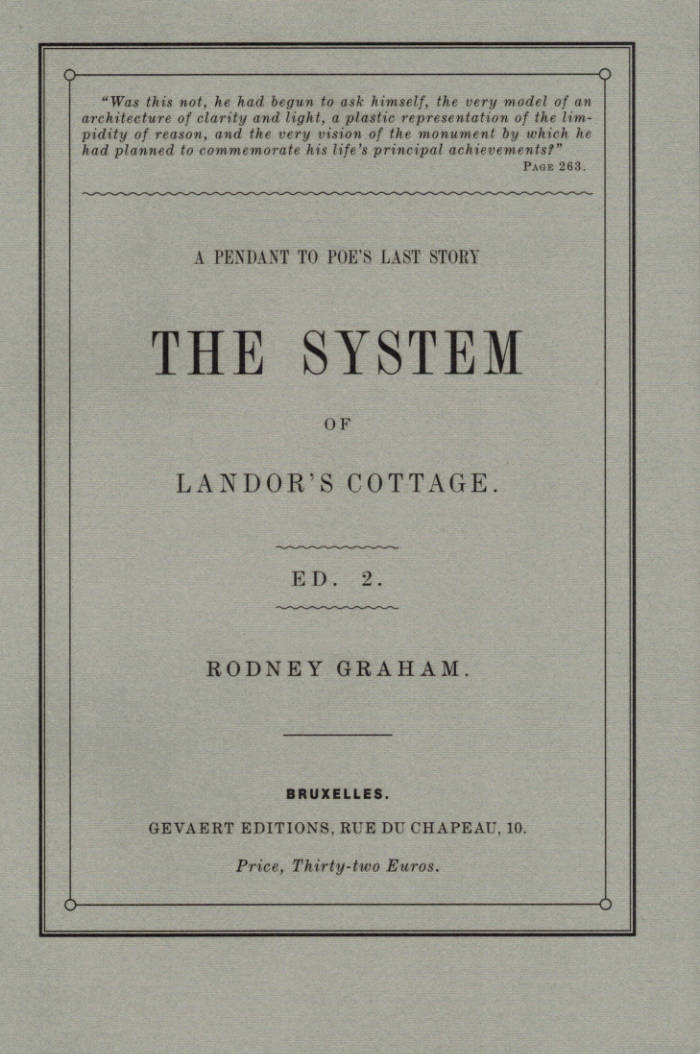
The System of Landor's Cottage. A Pendant to Poe's Last Story
Rodney Graham's The System of Landor's Cottage: A Pendant to Poe's Last Story is the most ambitious of the textual interventions that contributed to Graham's emergence onto the international art scene in the 1980s.
Part 'pataphysical investigation, part Roussellian exercise, the text begins with Edgar Allan Poe's short story "Landor's Cottage: A Pendant to 'The Domain of Arnheim,'" which describes a waylaid traveller's encounter with an uncannily pristine landscape and cabin in the Hudson River Valley. Into this short tale, which numbers less than twenty pages in most editions, Graham inserts an entire novel centered around an annex to Poe's original structure that houses a fantastical machine.
Through a complex set of nested tales, the origins of the machine become clearer but no less magical, and readers will be held rapt by accounts of architectural wonders, a mysterious cipher, and the romance of impossible science.

Cyberpositive
0(rphan)d(rift>)'s Cyberpositive is an experimental sci fi theory-fiction that streams a group of asked and unasked contributors writing, sampled and edited by 0D's Maggie Roberts. It was published in 1995 with support from Nick Land and Cabinet Editions, serving as a manifesto and as the catalogue for the debut exhibition of the same name. It came together in the spirit of much of 0D's visual work, bringing together processes of sampling and looping as well as the Burroughs text cut up technique, referring to a breakdown and reordering of language from a post human POV.
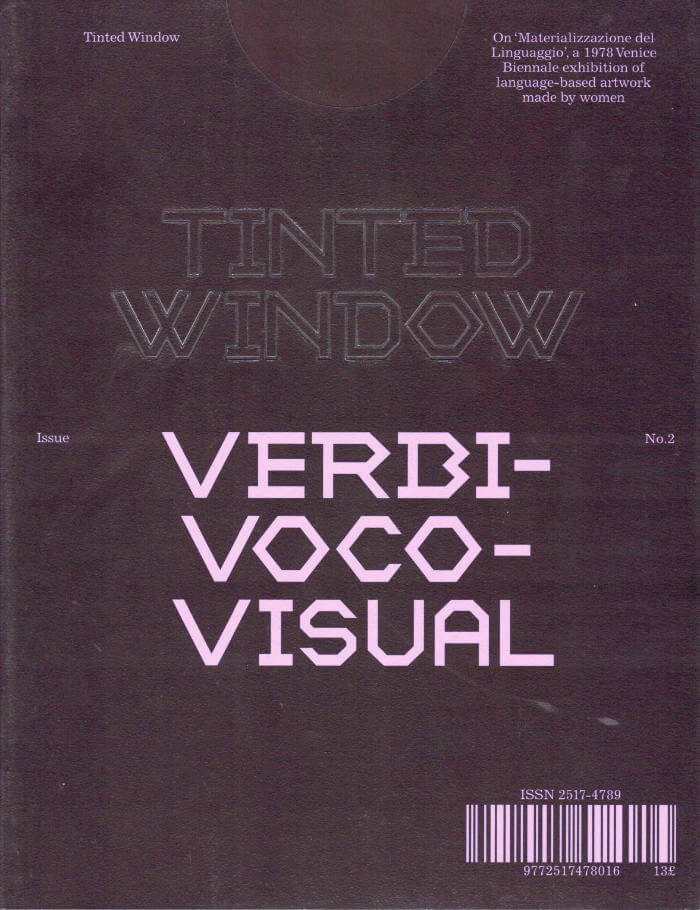
Tinted Window #2 : Verbivocovisual
This issue is dedicated to 'Materializzazione del Linguaggio', a 1978 Venice Biennale exhibition curated by Mirella Bentivoglio. The exhibition comprised of work by over eighty women artists working in a huge range of media, but united in their interrogation of text, voice and language. After the smashing hit of their Hervé Guibert No.1 issue, Tinted Window continues its focus on a single subject with issue No.2: Verbivocovisual. In No.2, Tinted Window brings much of this work back to the fore where many artists have slipped into the footnotes of an exciting period in art history. But much beyond our focus on this iconic exhibition, the issue features new essays and art projects by some of the best artists working with text, voice and poetry today.
No.2 features new commissions, translations and reprints from: Holly Antrum, Jeremy Atherton Lin, Mirella Bentivoglio, Angela Bianchini, Daniela Cascella, Anne Carson, Paula Claire, Paul Clinton, William Cobbing, Constance DeJong, Karen Di Franco, Sholto Dobie, Gustavo Grandal Montero, Katalin Ladik, Daisy Lafarge, Rosanna Mclaughlin, Silvia Mejía, Hannah Regal, Giovanna Sandri and Sue Tompkins.

My Mother Laughs (UK Edition)
In 2013, the filmmaker Chantal Akerman's mother was dying. She flew back from New York to Brussels to care for her, and between dressing her, feeding her and putting her to bed, she wrote. She wrote about her childhood, the escape her mother made from Auschwitz but didn't talk about, the difficulty of loving her girlfriend, C., her fear of what she would do when her mother did die. Among these imperfectly perfect fragments of writing about her life, she placed stills from her films. My Mother Laughs is both the distillation of the themes Akerman pursued throughout her creative life, and a version of the simplest and most complicated love story of all: that between a mother and a daughter.
Translated by Daniella Shreir with an introduction by Eileen Myles and afterword by Frances Morgan.

Artificial Gut Feeling
If winning can only occur in a competition between equal opponents, someone who isn’t equal will need to adopt a different strategy and let go of the promise, or the curse, of victory. Anna Zett takes up the challenge in this collection of personal science fiction, registering the traces systems of power leave in the body, in its locomotory, nervous and digestive systems. Zett’s voice appears in several textual guises, addressing authority, resistance, trauma and the physicality of language. Dedicated to the feminist revolution, the post-socialist subject of Artificial Gut Feeling questions logocentric and capitalist beliefs about the economy of meaning. This book gathers together fists, guts and brains to gain a deeper understanding of the non-verbal roots of dialogue.
"This being is able to transform movement into speech. It winds itself about inside me like a thick snake and I have to use all my strength to let it spin and do what it does. When I wilfully try to stop it, it begins to whisper words to me and that is even more unpleasant. If I were to associate this gut feeling with an emotion, I would say disgust. But this disgust is not directly linked to your name."—Anna Zett
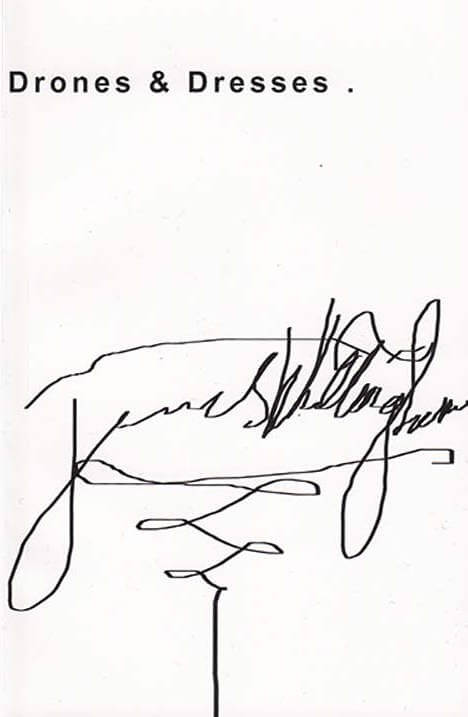
Drones and Dresses
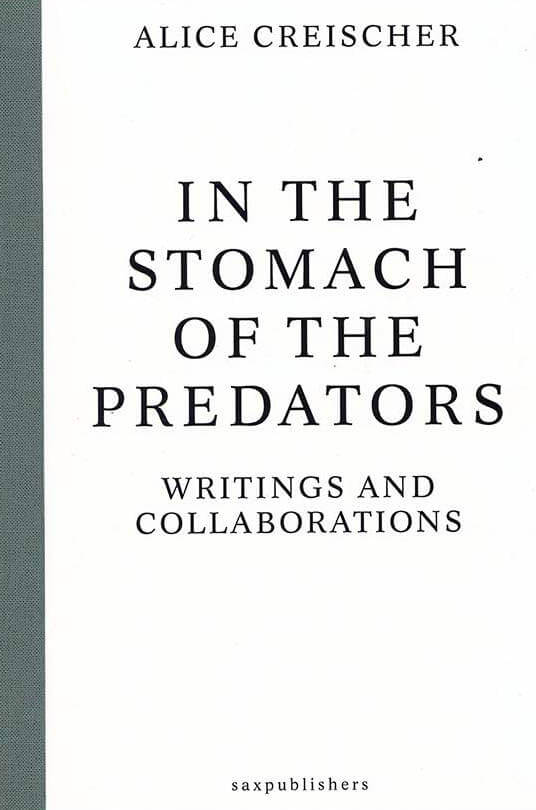
In the Stomach of the Predators
A selection of 22 texts that were written between 1989-2019 that problematize Creischer's constant struggle for a vocabulary to analyze and criticize, to comment and intervene in the social fabric she finds herself surrounded by. Rather than neatly discriminating between form and content, between emancipation and information, Creischer's lessons suggest various ways of inscribing one into the other of juxtaposing opposing poles.
Alice Creischer is a German artist, writer and theorist. Her artistic practice and theoretical work focuses on issues of economic and institutional critique, globalization and the history of capitalism.
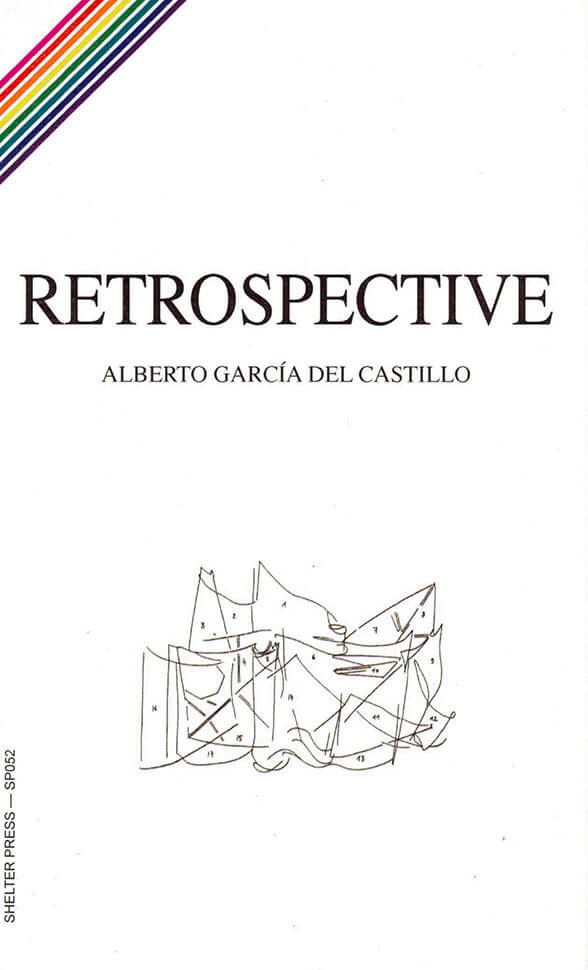
Retrospective
Retrospective is a comedy-science-fiction novelette about “faggotry” and the art world; depicting a retour-au-passé in contemporary painting and waving to some of the most beautiful homosexuals on Earth. Flaunting otherness, the alert reader can follow a clerk of The Land of Sculptures whilst he encounters the pretty faces of The Painter, The Foreign Painter, The Tyrolese Painter and other people doing art and drugs.
Retrospective includes “Thumbs-Up”, a superficial analysis of the normalisation of gayness; “Why Homos Are Better”, a masterpiece of investigative journalism in two parts, that originally appeared in Agony 2 (circa 1988–93), a zine edited by B. Boofy and William Bonifay; a drawing by Jurgen Ots; a photograph by César Segarra; and a poem by Lars Laumann.
Alberto García del Castillo writes genre fiction and nonfiction about communities and queer, performs his own and other people's writings, and collaborates in multiple configurations. He has published his writing in Girls Like Us, co-edited Midpoint (Théophile's Papers, 2016) and his two novels Merman (2017) and Retrospective (2014) were published by Shelter Press. Alongside Marnie Slater, is co-curator of Buenos Tiempos, Int.

Le Large
This light, pocketbook format publication by After 8 Books gathers works by French artist Julie Beaufils, and three short stories commissioned for the occasion, dealing altogether with social tensions and emotional explosions.
The ink drawings by Julie Beaufils that form the core of the book, follow a logic of editing, accumulation and narrative incompleteness: the figures come from memories of films or TV series, as sediments of mass culture, or sometimes from personal observations and experiences crystallized in images. Shapes and figures develop as an ambivalent collection, informed by the weight and the vibration of lines and strokes.
This book aims at triggering the interpretation of these works, and at making their “reading” more complex, more playful too. Graphic designer Scott Ponik composed a visual story close to a manga, part abstraction, part emotion. The narrative and affective potential of the drawings is further activated by their free association with three short stories by Michael Van den Abeele, Buck Ellison, and Reba Maybury. Van den Abeele tells about the inner thoughts of a donor at the sperm bank; Buck Ellison’s story follows a few hours in the life of some girls in the San Francisco area, dealing with the cruelty and the naïvety of their relationships; while Reba Maybury proposes an erotic analysis of the connection between desire and capitalism.